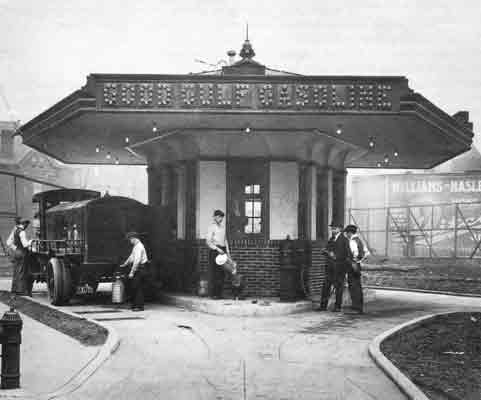Economy
Why Are There 115,000 (or 150,000) Gas Stations in America?
Published:
Last Updated:

And there’s more than one gas station in the United States as well. According to the U.S. Census Bureau, there were 114,533 gas stations in the U.S. at the end of 2012, the last year for which data is available.
The actual number of gas stations in the United States is a little difficult to pin down. According to the National Association of Convenience Stores (NACS), of the country’s 151,282 convenience stores at the end of 2013, 121,658 sell fuel, a year-over-year increase of 2.7%. National Petroleum News (NPN), a trade publication, put the number of gas stations at 157,393 in 2011.
Only about 3% of the stations are owned by major integrated oil companies like Exxon Mobil Corp. (NYSE: XOM) or Chevron Corp. (NYSE: CVX). About 37% of U.S. gas stations selling branded fuels are owned and operated by licensed independent retailers, and more than half of all gas stations are owned by an individual or a family.
According to a survey of its readers published last October, NPN reported that 75% of retailers pump between 500,000 and 2 million gallons of motor fuels a year. The most common number of pumps at a gas station is eight, and the retailers’ biggest concern is credit/debit card fees.
The average gross margin on a gallon of fuel is $0.12, according to NPN, and net profit per gallon averages $0.07. That means that if a gas station owner pumps 1 million gallons of fuel in a year, his net profit is $70,000. Not bad, but not great either. And that is where the convenience stores enter the picture.
ALSO READ: The 10 Cities Where No One Wants to Drive
The NACS found that convenience stores sold 80% of all U.S. motor fuel in 2010, which accounted for about two-thirds of total convenience store sales. The other one-third of sales is down to tobacco, beverages and other items. And while the revenue total from these items may be relatively small, this is where the profits are. Fuels sales account for about a third of profits while merchandise sales account for the rest.
Among retailers responding to the NPN survey, 97% said that tobacco sales were either very important or the most important profit center for their business. Some 89% said beverage sales were most or very important, 77% said a coffee program was important and 66% gave the nod to the sale of alcoholic beverages. Some 72% said that food service was the most or a very important profit center.
Gas stations’ 2012 revenue totaled $556 billion, compared with $450 billion in 2007, according to the Census Bureau. The payroll reached $15.76 billion in 2012, up from $14.67 billion, and the number of employees fell from about 891,000 to about 862,000 in the five years from 2007. As a percentage of total U.S. gross domestic product in 2012, gasoline stations accounted for about 3.4% of the $16.44 trillion total.
In 2007 the Census Bureau counted 118,756 gas stations in the United States. By 2012 that total had fallen by 3.6%. In the 15 years from 1997 to 2012, almost 10% of America’s gas stations disappeared.
Americans are driving less and buying less fuel for their newer, more fuel-efficient vehicles. Americans who live in larger U.S. cities with good public transportation are less likely to have a car than they were five years ago. In New York City, for example, more than half of the residents do not own a car.
These trends will continue to have an impact on the number of gas stations in the United States. Whether that number is 114,000 or 151,000 one thing is certain: the number of gas stations in the country will get smaller.
ALSO READ: The 10 Most Polluted Cities in America
The thought of burdening your family with a financial disaster is most Americans’ nightmare. However, recent studies show that over 100 million Americans still don’t have proper life insurance in the event they pass away.
Life insurance can bring peace of mind – ensuring your loved ones are safeguarded against unforeseen expenses and debts. With premiums often lower than expected and a variety of plans tailored to different life stages and health conditions, securing a policy is more accessible than ever.
A quick, no-obligation quote can provide valuable insight into what’s available and what might best suit your family’s needs. Life insurance is a simple step you can take today to help secure peace of mind for your loved ones tomorrow.
Click here to learn how to get a quote in just a few minutes.
Thank you for reading! Have some feedback for us?
Contact the 24/7 Wall St. editorial team.